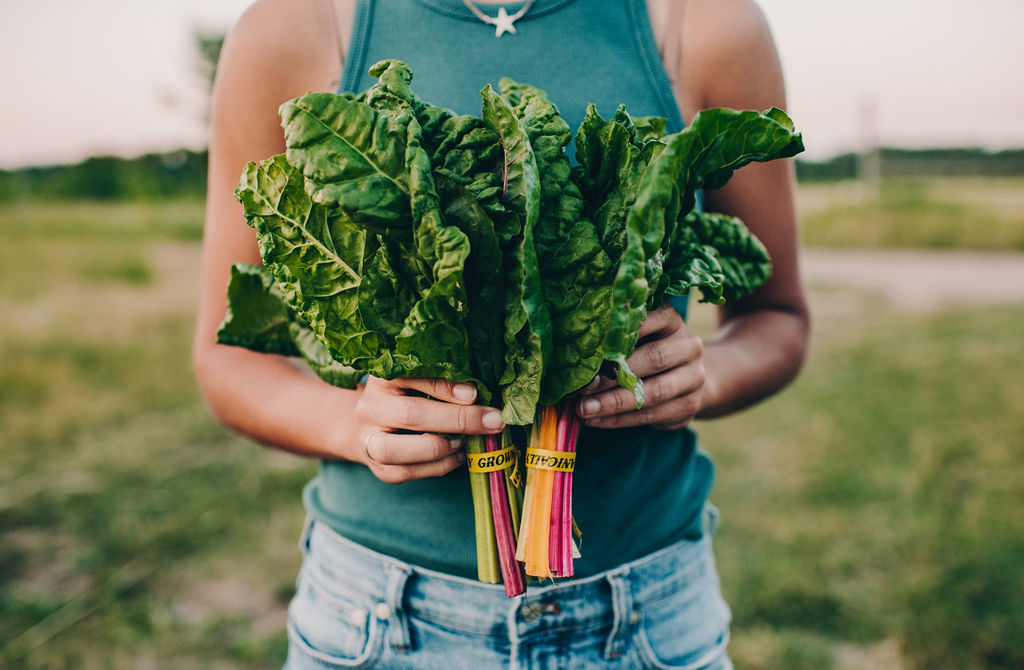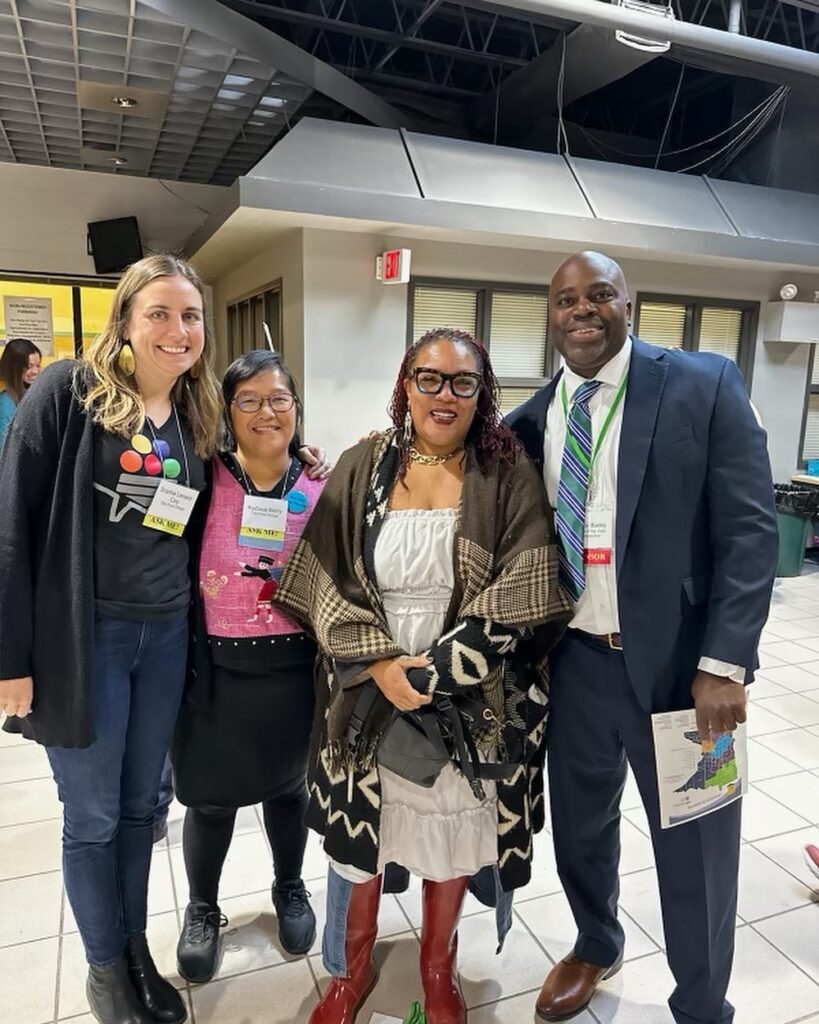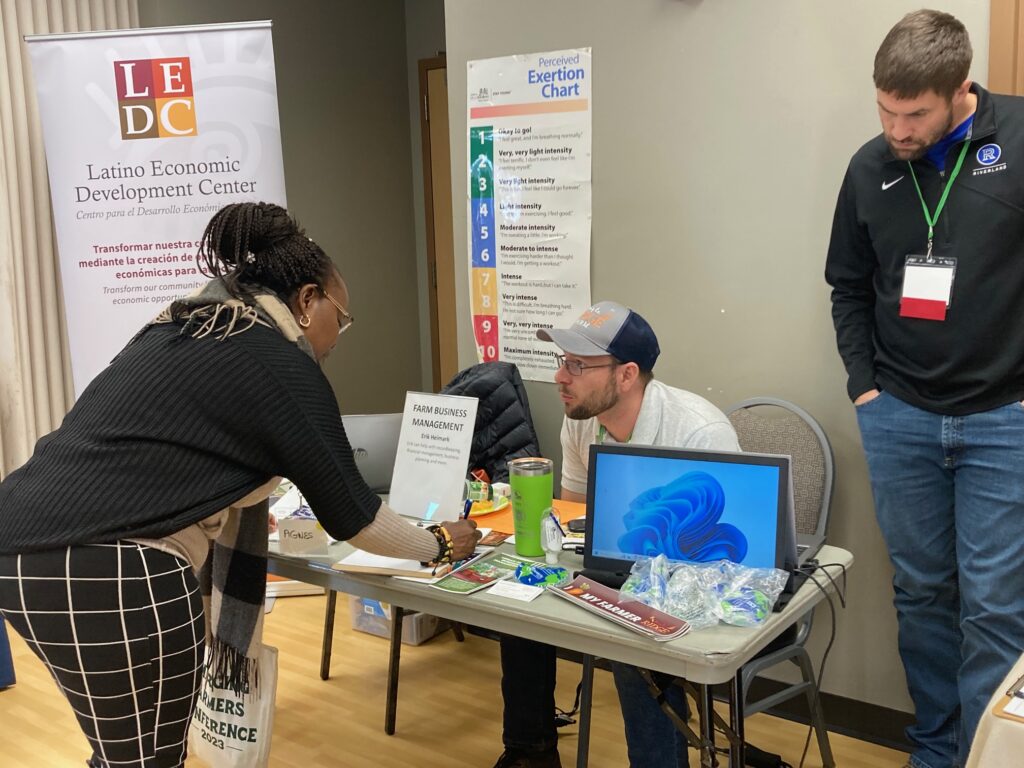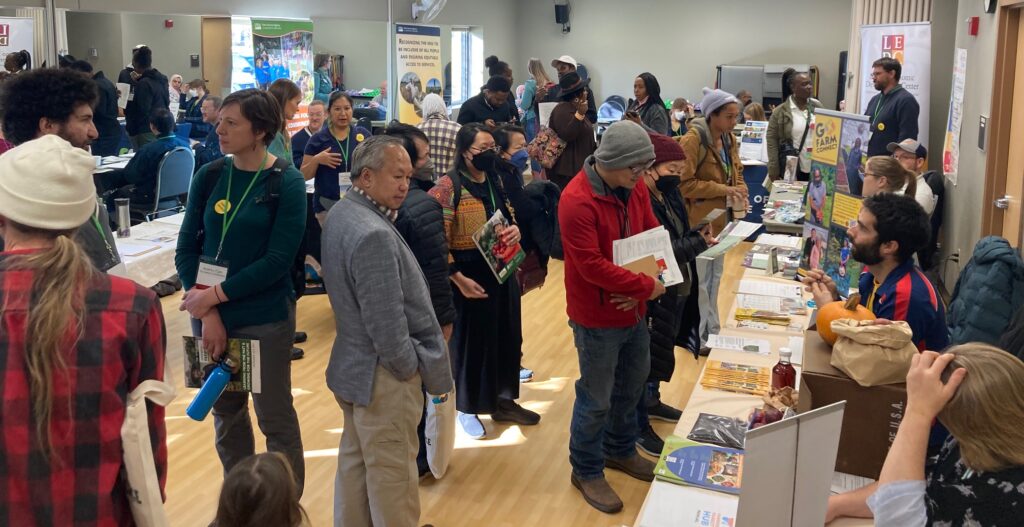2024 Workshops and Conference Schedule
Conference Schedule:
New this year we’ll be offering four long workshops on Friday. You must pre-register for these workshops. Boxed lunches will be provided.
Pre-registration has closed, but walk-ins are welcome!

Friday, November 1st
- 11:00 a.m. – 12:00 p.m.: Registration/Check-in
- 12:00 – 4:00 p.m.: Topic Intensive Workshops
- 4:00 – 6:00 p.m.: Social Hour, Exhibit Hall open, and Heavy Appetizers (Registration/Check-in continues)
Saturday, November 2nd
- 7:30 a.m.: Registration opens
- 7:30 – 8:30 a.m.: Breakfast
- 8:45 – 9:15 a.m.: Welcome
- 9:30 – 11:00 a.m.: Session 1
- 11:10 a.m. – 11:50 p.m.: Keynote- Erika Allen, Urban Growers Collective
- 12:10 – 1:30 p.m.: Lunch
- 1:45 – 3:15 p.m.: Session 2
- 3:30 – 5:00 p.m.: Session 3
Ongoing
- Resource Room, Yellow Room
- Exhibit Hall
- Wellness Room
- Prayer Room
- Mama baby room, 2nd floor
- Voter Information Main Hall
- Seed Swap, Main Hall
- The Soil and the Story
- Exhibit, Main Hall
Friday Workshops
Policy Deep Dive: Learn to use policy to get resources and representation
** There is no cost to attend this workshop
- Presenters: Zoe Hollomon, Executive Director of Midwest Farmers of Color Collective, Rootsprings Farm & Retreat Co-op, Amanda Koehler, Land Policy Associate Director, National Young Farmers Coalition, Garrett Graddy-Lovelace, Provost Associate Professor of Environment, Development Health, Faculty Advisor of Anti-Racist Research & Policy Center, American University. , Billy Hackett, National Sustainable Agriculture Coalition, and Levi Wellborn, Latino Economic Development Center
Course Description: Agricultural policy deeply affects farmers and the condition of our food system. Everything from land access to organic growing standards to FSA loans are affected by policy decisions made at every level. Join us for a deep dive into how BIPOC farmers can effectively make their voices heard. We will spend some time creating safe spaces to process the political climate, then move into action and harness our collective advocacy power. We will explore the landscape of agricultural policy, such as the farm bill and MN state policies, how they affect farmers, and what changes we can make. You will leave with a better understanding of federal policy, state policy and county policy, and how to make your voice heard at every level. Meet other local organizations that facilitate policy training and how to engage. Hear from other farmers who have testified and engaged in the legislative process, and gain the tools to ask your legislator for what you need. This session will serve as preparation for a listening session with elected officials on Saturday.
Climate Adaptation for Emerging Farmers: How farmers can plan for a changing climate
- Presenters: Nick Olson, vegetable farmer and organizer with Land Stewardship Project, Katie Black and Natalie Hoidal both from UMN Extension.
Course Description: Our changing climate influences both long-term and day-to-day farm management decisions. In this session, learn about what changes to our climate we have already seen, what scientists expect for future temperature, precipitation, and extreme weather patterns, and hear how other farmers are coping with the stressors of climate change. We will share research about farmer health and safety, ways to improve farm resilience, and experiences from farmers who are already using resilience strategies. Learn about infrastructure options, funding programs, and techniques for supporting resilient farming in the upper Midwest. By the end of the session, you will be able to take home ideas and craft a climate resilience plan for your farm operation.
Farm Finances: How to manage farm costs and plan a budget for profitability
Presenters: Sina War, Minnesota Farmers’ Market Association, Engagement & Inclusion Director, Kathy Zeman, Minnesota Farmers’ Market Association, Executive Director; Simple Harvest Farm Organics, Farmer, Ryan Pesch, University of Minnesota Extension, Educator – Ag Business Management, Erik Heimark, Central Lakes College, Speciality Crop Farm Business Management Instructor; Go Farm Connect Connector; Maple Ridge Produce, Farmer
Course Description: This workshop track is designed to empower farmers to start their farm business from a financially grounded place, and guide farmers who have already started their business with possible next steps towards financial sustainability. The topics to be covered in this workshop include:
- Developing a business plan: How will you finance for your farm (self-finance with farm funds, self-finance with non-farm funds like off-farm income or crowd-funding, apply for grants or loans); What crops will you grow; Where you are going to sell your products (what percentage will be wholesale or direct to consumer routes) – pros/cons of each point of sale; How much will you sell your products for (pricing); Calculating projected profitability
- Telling your story and farm goals: Why and how to tell your unique story and including this in grant and/or loan applications. Attendees will brainstorm and begin to draft their narratives. Use real applications as examples, such as NRCS grants and FSA microloans.
- Planning for taxes: Schedule F for individuals, LLCs, co-ops Participants in this workshop would leave with financial toolboxes (either physical or electronic) of budgeting templates, pricing guides, draft documents for grant or loans.
On Saturday there will be the Farmer Experiences with Funding session that would provide more specific grant or loan options available.
Navigating Soil Health & Production on Rented Land
Presenters: Tiffany LaShae, Farmer and soil researcher, Adria Fernandez, Grossman Soil Agroecology Lab, University of Minnesota, Global Greens Farmers and Staff, Farm incubator program in Des Moines, IA
Course Description: One of the most important aspects of a farm is soil health. But if you are on a small plot, incubator farm, or rented land it can be hard to justify using cover crops that take away space that could be used to make money. Investing in soil health is important even for farmers in rented land. Hear from Global Greens farmers in the field basic soil health practices they implement with success! Soil health is more than just applying fertilizer and inputs. What are 3 ways you can use cover crops that are inexpensive and don’t interrupt your growing cycles? What other ways can you build soil on small plots? Farmer and soil researcher Tiffany LaShae will show farmers practical ways to evaluate and understand the soil of your plot. Learn from her about soil formation, soil texture, pH, and how these soil properties affect nutrient availability and management practices. Adria Fernandez of the Grossman Soil Agroecology Lab at the University of Minnesota will break down lab testing for soil nutrient analysis and how you can use testing information to influence management. Farmers on rented land can improve their soil health and nutrient availability by understanding the soil they are working with, and techniques to improve the health of their plot even if they will not be there long term.
Saturday Workshops
Session 1, choose from:
Small Farm Tools: Tillage, Cultivation, Seeding and Post-Harvest
Are you looking to become more efficient on your farm? Not sure which tools are both affordable and useful? This talk will look at f different tools appropriate for use on small farms across a number of price points. We will talk about everything from walk-behind tractors, to push seeders to brush washers. We will go into detail about not only what the tools do, but how much they cost and where you can find them. This presentation will be hands-on – with a number of tools in the room for farmers to handle and ask questions about. Farmers considering applying for the MDA beginning farmer equipment and infrastructure grant are highly encouraged to attend.
Culturally Relevant Crops Session 1: African greens and Red River Valley Eggplant
Learn from other farmers about crops relevant to their culture and growing practice. Funwi Tita will speak about African greens, and how he adapts and markets these crops in a Minnesotan climate. Tita has been pivotal in expanding production and market outlets for bitter leaf, water leaf, and garden eggs in his community. Caliton Ntahompagaze will speak about growing African eggplant in the Red River Valley of Minnesota and bringing more awareness to this crop.
Emerging Farmer Experiences Starting Livestock Operations
Starting a new livestock operation can pose many challenges to emerging farmers. Farmers naviagate securing long-term land access, finding available processing facilities, veteraniarian services, and markets. Hear directly from emerging farmers about their experiences starting a variety of livestock operations. Presenters will speak about cultural livestock practices and their creative strategies for land access.
The Minnesota Department of Agriculture – Emerging Farmers Office: Ploughing through!
The Emerging Farmers Office (EFO) at the MN Department of Agriculture exists to serve emerging farmers like you. This session will focus on identifying the specific challenges faced by emerging farmers. We will collectively brainstorm solutions, and identify potential partnerships with farmers, organizations, and collaborators to also help inform our program and better serve emerging farmersmore effectively. We listened last year and are back to listen and share updates on your feedback. Come meet the new EFO staff members, Anthony Adams, and Emily Toner.
Session 2, choose from:
Seed Sourcing for Resilient Food Systems
Seeds are the foundation of food, and are critically important to a strong regional food system. Hear from other farmers about options for seed sourcing, seed varieties that work well in our region, and the importance of seeds in climate resilience. Participants will also learn about local seed saving projects and resources, and how they can get involved.
Organizing for Collective Land Access
Organizing communities for collective land access can be a complex process. Learn from experienced family and community organizers on what strategies emerging farmers implemented to be successful in organizing a variety of collective farming operations. A small panel of organizers will represent multi-family farming operations and community-organized farm incubators. Organizers will give brief presentations on their land holding strategies, governance structure, and will share about the challenges and successes of organizing collective farming operations. The presentations will be followed by a discussion with session attendees and sharing of resources for farmers who are interested in or actively pursuing collective farming operations.
Indigenous Foods of Minnesota
Treaty Rights of Tribes and Minnesota Residents, Seasonal Activities of Ojibwe people highlighting Netting Fish, Manoomin Harvesting, and Maply Syrup Harvests. Participants will learn about their rights to harvest from the Minnesota lands and sample value-added products from maple sap and manoomin.
Grounding Policy in the Voices of Farmers Listening Session
Whether at the township level or federal level, farmers’ voices are critical for creating just and practical policies for our food system. In this listening session, farmers will have space to share their experiences, stories, and needs to public officials at the state and federal level, including legislators, Congressional offices, and administrators. Potential interest areas may include land access, climate change, crop insurance, and language access to U.S. Department of Agriculture and Farm Service Agency programs, amongst others.
Session 3, choose from:
Farmer Experiences with Funding from the Minnesota Department of Agriculture
Have you thought about applying for funding from the Minnesota Department of Agriculture (MDA)? Hear from farmers who have received financial support from programs including Minnesota Grown cost-share programs, the Produce Safety Mini-Grant, and the Sustainable Agriculture Research Demonstration Grant. They’ll share about their application processes and how they’ve used these funds as a part of their farm operations. Meet the MDA staff that administer these programs and get a sense of whether these programs may be a good fit for your farm as well. Bring your ideas on other financial resources you’ve had experience with and want to share about with others in the room.
Culturally Relevant Crops Session 2: Molohkia, purslane, okra, armenian cucumber; beekeeping; heirloom corn
Learn from other farmers about crops relevant to their culture and growing practice. Pheng Her will speak about his experience of learning to keep bees and make a variety of products. The Sudanese Farming Group will speak about raising Sudanese crops in a communal and urban farm project at the microfarm site in New Hope, MN. They grow a variety of Sudanese crops including purslane, molohkia, okra, and armenian cucumber, and will talk about the value of increasing market access of these crops in Minnesota. Porfirio Perez will speak about the heirloom corn varieties he grows.
Whole Farm Ecosystem: How Wildlife Supports Your Farm
Farms are ecosystems where organisms live and interact in their environment. The health of the farm ecosystem is influenced by farm management practices. In this session, we will explore practices farmers can use to support birds and pollinators that also support the farm. Listen to how providing habitat and food for these types of wildlife can result in outcomes like reduced pest numbers and increased production. You will hear farmer perspectives on creating beneficial habitat along with ideas on leveraging funding to create more on-farm habitat. Leave the session with helpful resources that can help you apply holistic principles.
Athletes in Overalls: Farmer Movement Health & Wellness, and Self-Advocacy
During this session, we will discuss movement health and wellness from an athletic perspective with tips on managing food, fluid, sleep and stress for best performance. Additionally, we’ll talk about self-advocacy during work, and for those that want, practice movement patterns related to repeated bending and lifting.
The schedule is subject to change.
What else is happening at the Emerging Farmers Conference?
Other conference amenities include; a wellness room, prayer room, Exhibit Hall, resource room, voter registration and a seed swap.


